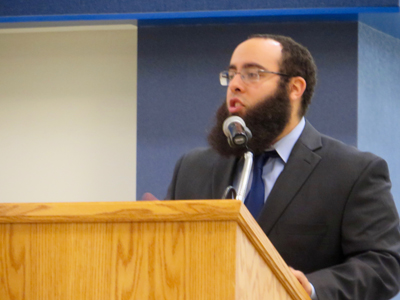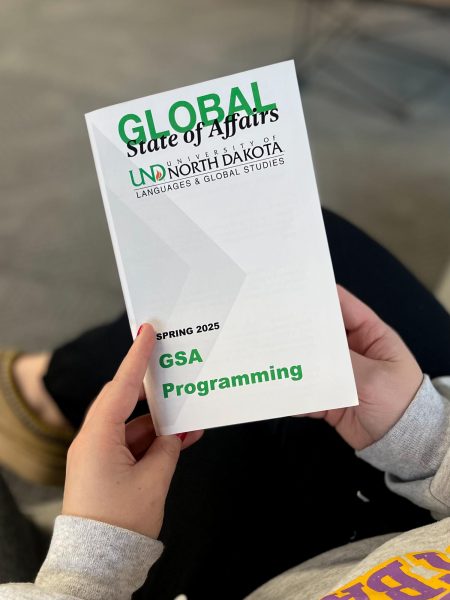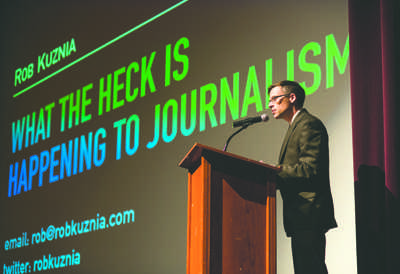Muslim scholar speaks on Shariah

Ahmed Khatar addresses a crowd as part of UND’s Interfaith Week. Khater discussed details of Islam’s religious law, Shariah. Photo by Lucas Amundson/The Dakota Student.
As part of UND’s Interfaith Week, the university welcomed Ahmed Khater, an expert on Islamic law.
Khater holds a doctorate in Islamic legal theory and theology. As an imam, he is a religious authority. Much of his work involves ruling on various aspects of Shariah, Islam’s legal system.
Khater addressed a crowd of around 30 in the Memorial Union’s ballroom, with much of his presentation focused on fatwas, the legal opinions of Islamic religious leaders.
Shariah involves the rulings and regulations that govern the everyday lives of Muslims. This includes diet, clothing, marriage, business and worship.
Khater said many people think of Shariah as only dealing with corporal or capital punishment. Shariah does cover these topics, Khater said, but they are limited to one chapter at the end of the Islamic law manual.
Shariah includes many things that are unequivocally clear, such as abstaining from alcohol and worshipping only one god. Other topics under Shariah leave room for interpretation, and this is where imams such as Khater come in.
Muslims are required to pray five times a day. These prayers are to take place at dawn, noon, afternoon, sunset and night. Khater said each prayer time has a two- to three-hour window, so most Muslims don’t have a problem meeting the requirements.
But what happens when they can’t?
Khater mentioned an example of a Muslim surgeon who needs to be in the operating room for eight hours. Would the surgeon combine missed prayers or start with the next prayer?
In this situation, a scholar would give a fatwa to determine the best course of action, Khater said, noting there isn’t always a consensus among imams. Many fatwas are considered on an individual basis.
“Most Muslims don’t know the rulings because they’re not jurists,” Khater said. “The vast majority of Muslims are not learned theologians; they’re average laymen who know the basics of the religion, but they haven’t studied 20, 30 years in a seminary.”
Questions regarding a Muslim’s diet can also require a fatwa. For example, eating pork is forbidden in Islam, but what constitutes pork might cause confusion.
Khater used Starburst candies as an example because they contain gelatin, which is made from the collagen of animals, including pigs. If a Muslim wonders if gelatin-based candies are allowed under Shariah, they seek the guidance of an imam.
Questions about foods that contain even trace amounts of alcohol also may require a fatwa. Khater gave the examples of beer-battered fish and vanilla ice cream — vanilla extract contains alcohol.
Even fruit can contain natural alcohol, so Muslims might question whether it’s acceptable to eat. Khater said it’s these everyday questions that keep him and other imams busy.
“My phone doesn’t stop ringing,” Khater said. “My wife gets mad when we’re eating dinner. She actually has to take my phone and put it her purse.”
Khater said Islam’s legal scholars answer questions by phone, email and social media such as Facebook, Twitter and Snapchat.
New questions about Shariah arise for Muslims due to changes in modern times. Khater said imams often adapt traditional rulings to modern concerns. He gave the example of referring to texts about how to pray while riding a camel to rule on flying in an airplane today.
Flying creates other obstacles to proper prayer, Khater said. Muslims face Mecca during their prayers, and the direction to their holy city isn’t always obvious from 40,000 feet in the air.
Khater said some Muslims have another concern about air travel: others’ fear of terrorism. He said people have come to him saying they are reluctant to pray on an airplane because they don’t want to upset other passengers or “get tackled by several air marshals.”
Imams look at each case individually before giving a fatwa, but they keep five main goals of Islam in mind while making decisions, according to Khater. These goals are the preservation of life, religion, property, lineage and family.
Much of Khater’s presentation consisted of answering audience questions.
“This all seems reasonable, but what’s happening in the Middle East is unreasonable,” a woman said. “So how can that be the same religion?”
Khater said terrorist groups are heretical subsets of Islam that are “masters of cut and paste,” meaning they’ve taken parts of scripture out of context to fit their goals.
“From the beginning of Islam, they have always warned against such people,” Khater said. “ISIS and Al Qaeda are not new phenomena. They’ve existed throughout the centuries, but they’ve always been banished and kicked out of the Islamic community.”
Khater acknowledged that Muslims have been accused of not being vocal enough in speaking out against terrorism, but he said this is far from the truth. He cited an open letter signed by 70,000 clerics in 2015 passing a fatwa against terrorist organizations.
“We’ve been doing nothing but condemning these people,” Khater said. “Combating them can be done with a sword, but it can also be with a pen and a pulpit. And that’s what we’ve been doing all along.”










